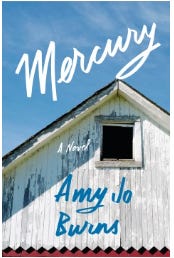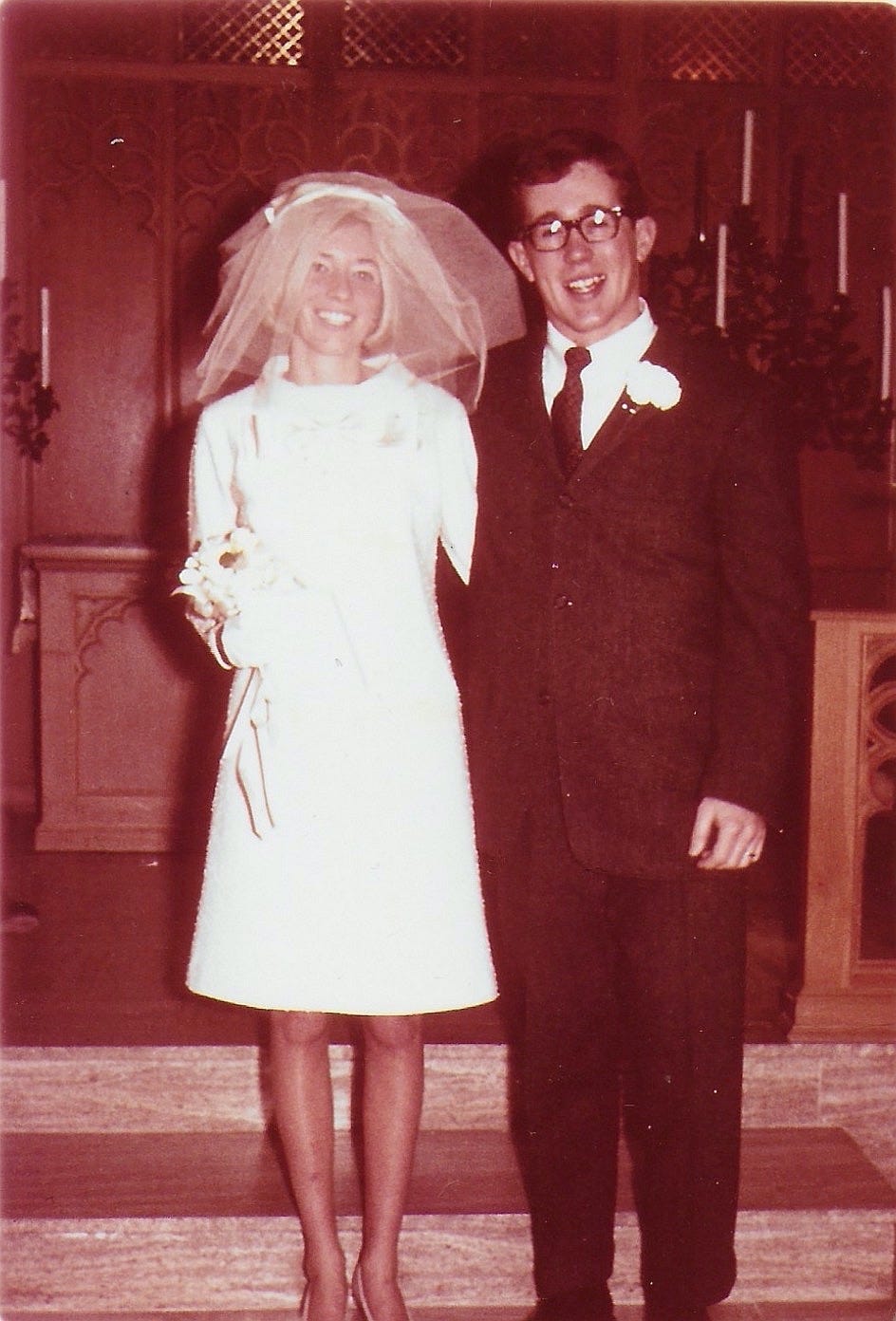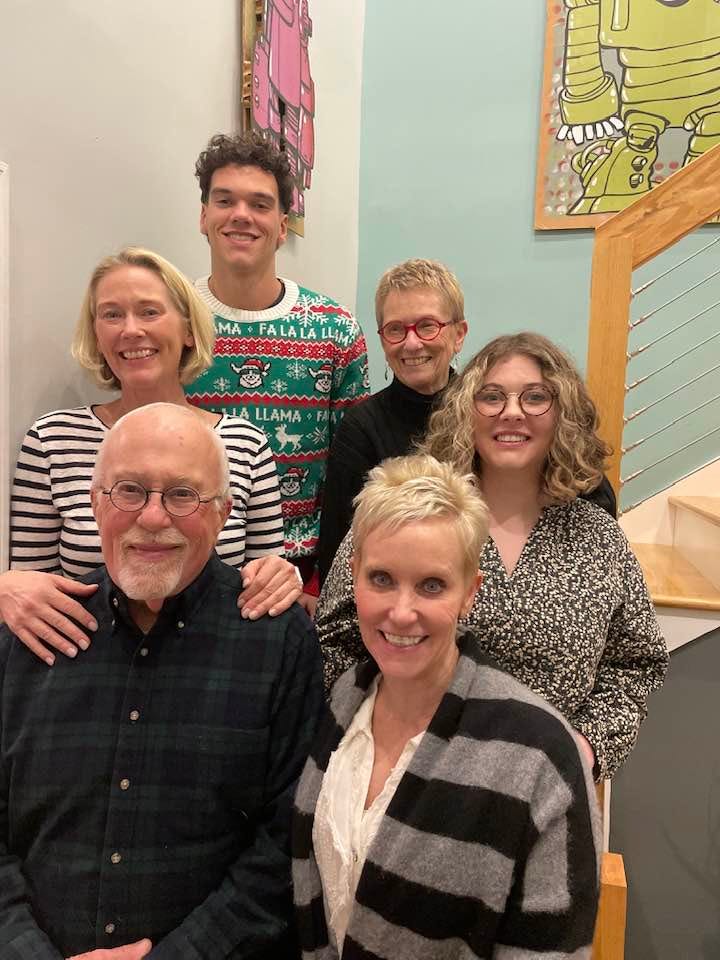I was just barely twenty when I got married, pregnant with the baby who’d become my daughter Jenny. Boy, it was hard. Steve and I were still in college, we lived in a tiny red and white trailer reminiscent of a Campbell soup can, in our landlord’s muddy backyard. It was freezing in that stupid trailer; the door of our bedroom often swung open on its own in the middle of the night, waking us up in a blast of cold (and sometimes snow).
But we were together.
And Steve had this sweet robins-egg blue MGB convertible. When spring came, we’d put the top down, turn the heater up and drive over to Brown County for a picnic, scouting out trash cans with soda cans we could collect and take in for the deposits, which we saved up until we had enough to go out to dinner.
Summer was grim, though. We moved to Steve’s small hometown so he could work in the steel forge there—third shift. We lived in a little apartment above the dime store, its windows overlooking a building that was being remodeled. Cats were living in it and all night, alone, I’d hear them—they sounded like babies crying. Steve would come home in the morning and try to sleep while workers threw plate glass windows into a truck below.
We were required to attend church on Sunday mornings and the family dinner that followed. We hadn’t quite figured out yet that we were adults and could say, no.
Have I mentioned that my mother-in-law didn’t like me?
Jenny was born in August, seemingly a little pissed off about being in the world. She cried a lot; I felt totally incompetent—but, oh, was she ever cute. And ours.
Meanwhile, Steve’s dad decided we needed a more sensible car and traded the MGB for a red Dodge Dart that, for a while, made me cry every time I looked at it. The good news (besides Jenny) was that Steve got laid off at the steel forge, which gave us the excuse to flee back to Bloomington. Steve drove the rental truck with our hand-me-down furniture; his dad must have driven the Dodge Dart. I rode in my mother-in-law’s Thunderbird—no air conditioning or open windows because…babies and drafts. Plus, she chain-smoked the whole three hours. Elevator music on the radio.
One of the happiest moments of my life was waving goodbye to them from the balcony of our new apartment. We whooped when they were out of sight. Finally, there we were in our very own, real lives. It was still hard. Getting through school, sometimes missing the fun of fraternity parties and football games. (One Saturday someone gave Steve a free game ticket and I sat on our balcony with Jenny, hearing the band and the cheers in the distance and thinking, what have I done?)
We did everything backwards—except for the falling in love part. Sequence, sequence, I’m always telling my writing students. But it worked.
Today is our fifth-seventh (!) wedding anniversary.
All of which is a roundabout way of getting to the idea that sometimes you love books just because they’re good; sometimes you love them because they’re good and they speak to you in a very particular way. ,
Amy Jo Burns’ Mercury did just that.
Families. Secrets. Lies. I’m always a sucker for that. But what I loved, what seemed so real to me in Mercury was the love story of Marley and Waylon, who marry at eighteen with a baby on the way and are two steps behind their own young lives as they unfold.
They can’t afford a place of their own and have to share Waylon’s boyhood bedroom. Marley dated Waylon’s brother Baylor before she fell in love with Waylon. Awkward. Waylon’s mother Elise is furious about the pregnancy and withholds her love from Marley. Waylon’s father Mick, a volatile Vietnam War vet, sees the family roofing business as a kind of dynasty but leaves the work to Baylor and Waylon while he does as he pleases.
Thank God for Shay, Waylon’s fourteen-year-old brother, who adores Marley from the start
Marley and her mother Ruth, an itinerant nurse, have moved around a lot by the time they arrive in Mercury in June of 1990. Marley’s tired of moving; she longs for a place where she belongs. The day after they arrive in town, she wanders over to a park where there’s a baseball game going on. She’s perching at the top of the bleachers when two of the players get into a fight.
“‘Those Joseph brothers,’ someone in the stands muttered. ‘The only boys I’ve ever seen who fight when they’re on the same team.’”
A woman in front of her calls out for the boys to stop fighting. They do, instantly.
Waylon reaches a palm to Baylor—and in that moment Marley falls in love with him. But Baylor gets to her first, everyone watching, and before she knows it, she’s agreed to let him drive her home. Soon she’s become a regular at Joseph family dinners—and, increasingly, part of the family.
We don’t need “and then and then and then” here. It’s enough to say that, eventually, Marley starts up a secret relationship with Waylon until she gathers the courage to tell Baylor she doesn’t want to be with him. That night, she sneaks to Way’s bedroom.
They’re crazy in love, eighteen-year-old love that makes it impossible to stay away from each other. (The kind of love that many, many times made me give into leaving the library where we’d gone to study and…you know.) The thing is, and maybe this is what’s so different—and potentially dangerous—in what’s presumed to be a too-young marriage: love doesn’t suddenly grow up, it stays exactly the same. You’re pregnant, then you’re new-parent exhausted, doing your best to be as responsible as you know how to be, but what you still want most is to be together.
Looking back, I wouldn’t have missed that feeling and how growing into adulthood (eventually, painfully) with the person I love left us both still kids in the best, most fundamental ways. I can’t—wouldn’t want to—imagine my “one wild and precious life” any other way.
Mercury is mainly a family story about how a well-meaning mother’s desire for her three beloved sons not to be like their father nearly derailed their lives, and how secrets and lies can tear people who love each other apart. We see the family from every point of view but Mick’s, a decision I question. In particular, not knowing how he saw the family, how he rationalized his selfish behavior, left me wondering about the relationship at the core of the book.
Still, it’s a wonderful, well-told story I could not put down.





Thanks--and back at you.
Loved hearing your story.
Look forward to seeing you tomorrow.
Is that brief enough?
Sandy =)